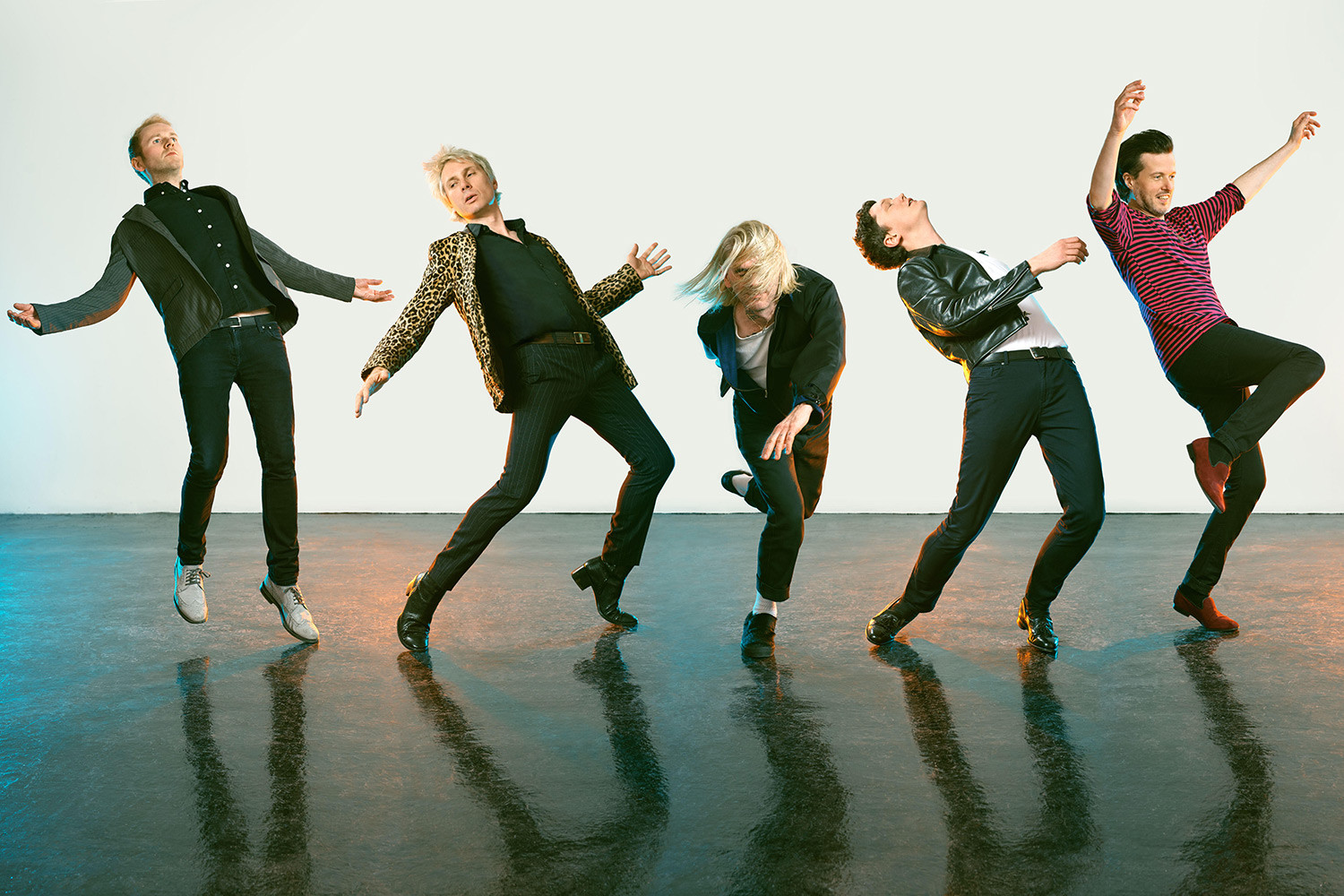Franz Ferdinand frontman Alex Kapranos had fun with their new record, ‘Always Ascending’. “Making the album was really enjoyable, it was quite a thrill,” he says. It’s their first full-length in four years, and in that time guitarist, Nick McCarthy left the band – it could have been quite different. “When we finished our last record it was ten years of the band’s life there, and it felt with making this record it was the beginning of a new decade, and we had a choice. Did we either live in the decade we were in before, look back and say, ‘We’re gonna stay there forever’, or do you think we’re gonna move into the next decade? I guess that was our decision.”
“For me, the holy grail as an artist is to be able to make something original, which we haven’t done before, which keeps our identity.” They’ve certainly done that. ‘Always Ascending’ takes them to places you wouldn’t expect from the same group who wrote ‘Take Me Out’, but it retains that familiarity of a band now 15 years strong. Along the way, they’ve picked up new members Dino Bardot and Julian Corrie. “When we asked Julian to join the band he didn’t play any of the old songs until we had a gig to play about six months later,” says Alex. Rather than dwelling on years gone by, “we worked out our direction was always looking forward. We weren’t looking to the past at all! We were looking to make something new.”
That doesn’t mean that they’ll suddenly drop the hits, though. “I always write a set half thinking of what I like and half thinking of what I would like if I was coming to the gig. I’ve gotta put myself in the perspective of a fan as well as a performer.” Alex does still drop older fan favourites, such as 2004 b-side ‘Love and Destroy’, however. “I enjoy putting in pretty obscure ones as well. Also sometimes you get people in the audience shouting out for songs you haven’t played for years, so I turn to the band like, ‘Hey, you up for that one? That could be fun’. From time to time we will drop songs from the set if we’re a little bit sick of them, so sometimes I’ll say before a gig, ‘Does anyone mind if we drop ‘Michael’ or something tonight? I don’t know if I feel like it tonight’.”
[sc name=”pull” text=”It was important to look to Europe for inspiration.”]
The album itself has a very distinct French vibe, and that’s in no small part thanks to producer Phillipe Zdar, Alex explains. “I loved working with Phillipe. We bonded very quickly and closely, and I think we shared some similar attitude to making music, this understanding that you make music to make people feel something. I know that seems like a very obvious thing to say, but it’s so often forgotten once you get caught up in technicalities and the cold process of actually making the thing. That’s why you make it in the first place; you’ve got something emotional you want to express. At every stage of making the record Phillipe was insistent we remember that, and that’s always been important to me as well.
“It does have a very French flavour, and for us, it was important to look to Europe for inspiration. Right now I feel a greater bond with Europe than ever, and after making this record, I feel a deep bond with Paris too as it played a big part in making this album.”
Before ‘Always Ascending’ came the band’s 2015 collaboration album with LA duo Sparks, ‘FFS’. Alex drew a lot from the experience. “I found it inspirational working with Ron and Russell,” he explains. “They’re both very elderly gentlemen now, but they have they also share a desire to create the new and move forward. They have a lot of energy for such old men, you know? I found that very inspiring.
“I enjoyed making that record, too. It was refreshing, and I feel it really shook us up from the roles that we had in the band. It gives you confidence as well; you realise if I can write a song with Ron Mael and it sounds good, I can probably write a song with somebody else and make it sound good.” And so he has. “Recently I did this record with the group BNQT, the guys from Midlake, and that was fun. Very different from the FFS collaboration. I wasn’t so in that; it was only a couple of songs.
“Any collaboration is always stimulating. Recently I got together a bunch of musicians who did music from Jim Jarmusch films at The Barbican. Anytime you work with another musician it gives you a different perspective you learn something new from them.” While he has no plans to work with anybody in particular, Alex says that he loves collaborating. “The best thing about the FFS record was how much it was a total surprise. Nobody was expecting it; even our label wasn’t expecting it. We called Domino to tell them we’d written a record with Sparks and they were like, really? I was like, yeah, can we record it?”
At the end of 2015, when the band started work on the album, Alex bought a piano. “I’ve never really had a nice piano before,” he muses, “and I am in love with this piano, totally in love with this piano. A lot of the songs were written on the piano; you write differently. If there was a guitar part, it was a guitar part added to a piano song for the most part, like in ‘Lazy Boy’ for example where the guitar’s quite dominant. The song was written on the piano, and then the guitar added.”
Alex asserts, however, that “the goal was always to make a record by recording us playing live in the studio together, so when you listen to the record you hear that it’s the band members all playing in a room together.” Despite this, they were “embracing as much technology as we could when we were writing and trying to use technology to push us into ways of writing we hadn’t before.
“For example, basslines were written, but they were written on the computer the way you’d write for a sequencer. Some of the drum parts as well. A lot of the parts I was playing melody lines, but then triggering them from the sequencer or from the computer to learn them as a band and then play them in the studio, and play them live as if you were just the most basic raw rock and roll band. It’s taking what’s available to you and trying to subvert it and use it to perform in a way you don’t see people doing around you. I guess that’s always the goal, and that’s the way we went about it to a great extent when making this record.”
[sc name=”pull” text=”There’s this belief that if you want to achieve emotional honesty it has to come from yourself, and I think that’s bollocks.”]
Alex insists there’s not much of the personal confessional on this album, stating: “Something that we really pushed on this record was to write from the perspective of fictional characters and to approach writing lyrics the way you might approach writing a short story or a film script. When Bob and I were writing songs like ‘Lois Lane’ and ‘Slow Don’t Kill Me Slow’, we had this idea of creating characters to search for that emotional truth like you’d find in a song which is self-confessional and search for that truth in the characters we created. We were trying to make something as vivid and as moving as you would from a personal confessional song because I truly believe you can reach the same emotional depth from a fictional character.
“There’s this belief, this presumption that if you’re as a musician or a songwriter if you want to achieve emotional honesty it has to come from yourself, and I think that’s bollocks. If that were true, then it would apply to other mediums as well. Every time I see an actor on the stage performing an emotionally convincing role they aren’t necessarily drawing from personal experience; there’s a lot of fiction in there, and you can apply that to songwriting and also performance as a singer just as much.”
The album ascends to a seedy disco crescendo with a double whammy of dancing with ‘Glimpse of Love’ and ‘Feel The Love Go’, Alex says. “They’re the apex of the energy of the album. The outro of ‘Feel The Love Go’ is the most hedonistic moment of abandon, and then we drop you right down at the end for ‘Slow Don’t Kill Me Slow’. It’s drama, that’s all it is. That’s what I love when I listen to somebody else’s album, so that’s what I wanna put in my own.”
Franz Ferdinand’s album ‘Always Ascending’ is out 9th February. Taken from the February issue of Dork, out now.





